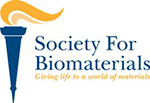
Potential and Challenges of Bioceramics
MRS and ACerS held a two-day virtual workshop on April 7 and 8, 2021 that brought together experts in the field from academia, industry and clinical backgrounds to share their discoveries and insights in medical applications of bioceramics.
Attendees learned about:
- Current challenges in bioceramics
- Lifecycle of bioceramics from synthesis to clinical translation
- Development of next-generation bioceramic materials
- Fundamentals of bioceramics synthesis
- Clinical application-oriented requirements
Program
April 7, 2021
Bioactive Glass Applications: Past, Present and Future, Francesco Baino
Bioactive Glasses in Tissue Engineering and Biofabrication, Aldo Boccaccini
Merging the Paths of Fundamental Research and Clinical Translation; The Innovation Multiplier, Steve Jung
How Chemistries and Emerging Technologies Are Transforming Tissue Engineering, Hala Zreiqat
April 8, 2021
Novel Additive Manufacturing Technologies for Bio-ceramics, Huisuk Yun
Bioceramics in Reparative Dentistry and Endodontics—Current Aspects and Future Perspectives, Mario Tonamaro Filho
Silicon Nitride: An Antipathogenic and Osteogenic Bioceramic for Osteoarthropathy, Bryan McEntire
Panel Discussion with Hala Zreiqat, Aldo Boccaccini, Bryan McEntire, Mario Tonamaro Filho, Francesco Baino and Steve Jung; moderated by Laura Fabris)
Moderator
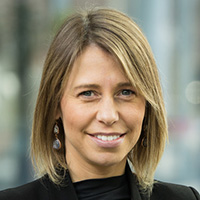
Laura Fabris, Rutgers, The State University of New Jersey
Laura Fabris is an associate professor of materials science and engineering at Rutgers, The State University of New Jersey. Prior to joining Rutgers in 2009, she was a postdoc in the Department of Chemistry and Biochemistry at the University of California, Santa Barbara. Fabris earned both her BS/MS and PhD degrees in chemistry from the University of Padova, Italy. Her research focuses on rationally designing plasmonic nanomaterials, employing both experimental and computational approaches, to address biologically- and medically-relevant questions and, most recently, to design efficient nanostructured photocatalysts.
Speakers
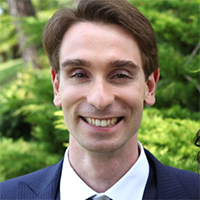
Francesco Baino, Politecnico di Torino
Francesco Baino is a senior assistant professor (tenure-track) in the Department of Applied Science and Technology, Politecnico di Torino (Italy). He received his MS degree in biomedical engineering (summa cum laude) and PhD degree in materials science and technology from Politecnico di Torino in 2006 and 2010, respectively. Baino has published more than 145 peer-reviewed journal articles and 20 book chapters (H-index = 36, total citations 3870), and is author of three patents. His current research interests include the design, processing and characterization of biomaterials for healthcare and tissue engineering applications with a special focus on bioceramics and bioactive glasses, as well as processing and testing of advanced ceramics. He is a member of the American Ceramic Society (ACerS) and Founding Member of the National Bioengineering Group in Italy (GNB). He is Associate Editor of the International Journal of Applied Ceramic Technology (Wiley) and Frontiers in Bioengineering and Biotechnology (Frontiers Ltd). Baino has been serving as a guest editor for more than 10 special issues in the field of bioactive glasses and bioceramics. He also serves as a reviewer for more than 30 international journals in the field of biomaterials, ceramics and high-tech materials.
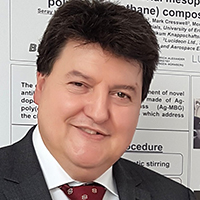
Aldo Boccaccini, University of Erlangen-Nuremberg and Imperial College London
Aldo R. Boccaccini is a professor and Head of the Institute of Biomaterials at University of Erlangen-Nuremberg. He is also a visiting professor at Imperial College London. He holds a nuclear engineering degree from Instituto Balseiro, and a PhD degree from RWTH Aachen University and Habilitation from Technical University of Ilmenau. Prior to his current position, he spent 10 years at Imperial College London, Department of Materials, as lecturer, reader and professor of materials science. He has held post-doctoral positions at University of Birmingham and University of California, San Diego. He was Head of the Department of Materials Science and Engineering in Erlangen (2017-2019). The research activities of Boccaccini are in the field of ceramics, glasses and composites for biomedical, functional and/or structural applications. He is the author or co-author of more than 900 scientific papers and 25 book chapters. His work has been cited more than 44,000 times and he was included in the “Highly cited researchers” lists in 2018 (Clarivate Analytics) and 2014 (Thomson Reuters). He is the Editor-in-Chief of the journal Materials Letters (Elsevier), Founding Editor and Editor-in-Chief of the journal Biomedical Glasses and serves on the editorial board of more than 10 international journals. Boccaccini has been a visiting professor at different universities around the world. He is a Fellow of the Institute of Materials, Minerals and Mining (IOM3), the American Ceramic Society, the Society of Glass Technology and the European Ceramic Society. His achievements have been recognized with several awards including the Materials Prize of the German Materials Society (DGM) in 2015, the Turner Award of the International Commission on Glass (2016) and the Friedberg Lecture Award (2016) of the American Ceramic Society. Boccaccini is also an elected member of the World Academy of Ceramics and of the National Academy of Engineering and Applied Sciences of Germany (acatech) and advisor to the Science and Technology Ministry of Argentina. Boccaccini serves on the Executive Committee of the Federation of European Materials Societies (FEMS) representing the German Materials Society and he has been a member of the Council of the European Society for Biomaterials (ESB) since 2015. Boccaccini has served in several review panels of the European Research Council (ERC) and of the German Research Foundation (DFG) (2011-2020).
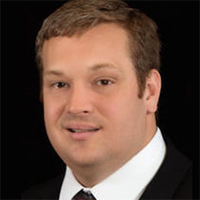
Steve Jung, Mo-Sci Corporation
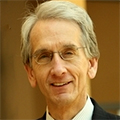
Bryan J. McEntire, SINTX Technologies Corporation
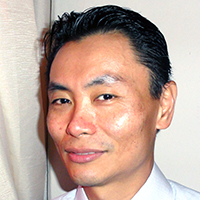
Mario Tanomaru-Filho, Universidade Estadual Paulista
Mario Tanomaru-Filho graduated from the University of São Paulo with a MS degree in endodontics and earned his PhD degree in endodontics from São Paulo State University. He is now a professor of endodontics at the Faculty of Dentistry of Araraquara, Universidade Estadual Paulista, where he also works as Coordinator of the Graduated Course in Endodontics. He is a recipient of the CNPq Research Productivity Scholarship and has authored more than 210 papers in peer-reviewed international journals.
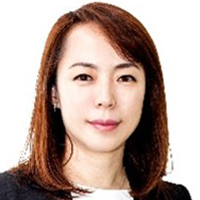
Hui-suk Yun, Korea Institute of Materials Science and University of Science and Technology
Hui-suk Yun has a PhD degree in materials science engineering from the University of Tokyo. She completed her postdoctoral research at the National Institute of Advanced Industrial Science and Technology (AIST, Japan) and then worked as a lecturer at the Consolidated Research Institute for Advanced Science and Medical Care at Waseda University. She is presently working as Head of the Department of Advanced Biomaterials Research at Korea Institute of Materials Science (KIMS) and is a professor in the Department of Materials Science at the University of Science & Technology (UST). Her research field includes bioceramics in tissue engineering, mesoporous materials and total technologies for ceramic additive manufacturing, including materials, processes and systems. She has 38 domestic patents (30 patented and nine pending), 13 international patents (five patented and eight pending), and 59 SCI papers. She has also contracted five technology transfer contracts relating ceramic additive manufacturing. She has received many honors, with the last ones in 2019-2021 being both the 2021 Global Ambassador Award and the 2020 ECD Jubilee Global Diversity Award from the American Ceramic Society, both the 100 Most Distinguished Research Achievement of Korea Award and the 10 Most Distinguished Research Achievement of National Research Council of Science & Technology Award from the Ministry of Science and ICT, and the World’s Top Technology Prize from the Korea Institute of Materials Science.
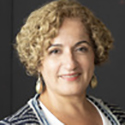
Hala Zreiqat, The University of Sydney; ARC Training Centre for Innovative BioEngineering
Hala Zreiqat, AM, is a professor of biomedical engineering at The University of Sydney and Director of the ARC Training Centre for Innovative BioEngineering. She was a National Health and Medical Research Council Senior Research Fellow from 2006-2020 and a Radcliffe Fellow at Harvard University from 2016-2017. She is an associate of the John A. Paulson School of Engineering and Applied Sciences at Harvard University and an honorary professor at Shanghai Jiao Tong University. Zreiqat is a trailblazer in the field of biomaterials and tissue engineering and has authored over 140 peer-reviewed publications with over 6,000 citations. She is a national leader in advancing collaborative research ventures between academics, clinicians and industry in the field of musculoskeletal disorders and biomaterials research, which has led to four awarded and four provisional patents and more than $18 million in competitive funding, including major grants from the NHMRC, ARC and the NSW Medical Devices Fund.
Zreiqat’s extraordinary contribution to regenerative medicine and orthopedic research has led to a number of national and international awards, including being named a member of the Order of Australia (2019), the 2018 New South Wales Premier’s Woman of the Year, the King Abdullah II Order of Distinction of the Second Class (2018), Eureka Prize winner for Innovative Use of Technology (2019), and University of Sydney Payne-Scott Professorial Distinction (2019). She is also a Fellow of the Australian Academy of Health and Medical Sciences, the Australian Academy of Technology & Engineering, and the International Orthopaedic Research Society, and is a past president of the Australian & New Zealand Orthopaedic Research Society.
Organizers
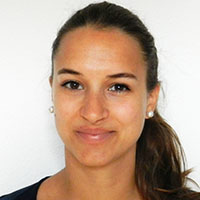
Harvard University and Massachusetts General Hospital
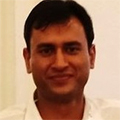
Rutgers, The State University of New Jersey




